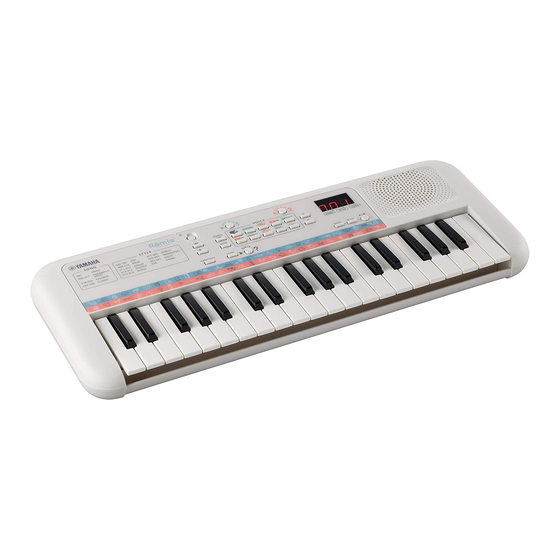Yamaha Remie PSS-E30 Instrukcja obsługi - Strona 4
Przeglądaj online lub pobierz pdf Instrukcja obsługi dla Klawiatura elektroniczna Yamaha Remie PSS-E30. Yamaha Remie PSS-E30 21 stron.
Również dla Yamaha Remie PSS-E30: Instrukcja obsługi (22 strony)

PRECAUTIONS
PLEASE READ CAREFULLY
BEFORE PROCEEDING
Please keep this manual in a safe and
handy place for future reference.
WARNING
Always follow the basic precautions listed below
to avoid the possibility of serious injury or even
death from electrical shock, short-circuiting,
damages, fire or other hazards. These precautions
include, but are not limited to, the following:
Power supply
• Do not place the USB cable near heat sources such as
heaters or radiators. Also, do not excessively bend or
otherwise damage the cable, or place heavy objects on it.
• Only use the voltage specified as correct for the
instrument. The required voltage is printed on the name
plate of the instrument.
• Included USB cable is designed for use with only this
instrument. Do not use for any other instrument.
• Check the plug periodically and remove any dirt or dust
which may have accumulated on it.
Do not open
• This instrument contains no user-serviceable parts. Do
not open the instrument or attempt to disassemble or
modify the internal components in any way. If it should
appear to be malfunctioning, discontinue use
immediately and have it inspected by qualified Yamaha
service personnel.
Water warning
• Do not expose the instrument to rain, use it near water or
in damp or wet conditions, or place on it any containers
(such as vases, bottles or glasses) containing liquids
which might spill into any openings. If any liquid such as
water seeps into the instrument, turn off the power
immediately and disconnect the plug from the AC outlet.
Then have the instrument inspected by qualified Yamaha
service personnel.
• Never insert or remove a plug with wet hands.
Fire warning
• Do not put burning items, such as candles, on the unit. A
burning item may fall over and cause a fire.
4
PSS-E30 Owner's Manual
Influences on electro-medical devices
• Magnetism may affect electro-medical devices.
- Do not use this product near medical devices or inside
areas in which the use of radio waves is restricted.
- Do not use this product within 15 cm (6 in.) of persons
with a heart pacemaker or defibrillator implant.
Battery
• Follow the precautions below. Failure to do so might result
in explosion, fire, overheating or battery fluid leakage.
- Do not tamper with or disassemble batteries.
- Do not dispose of batteries in fire.
- Do not attempt to recharge batteries that are not
designed to be charged.
- Keep the batteries separate from metallic objects such
as necklaces, hairpins, coins, and keys.
- Use the specified battery type (page 13) only.
- Use new batteries, all of which are the same type, same
model, and made by the same manufacturer.
- Always make sure all batteries are inserted in
conformity with the +/- polarity markings.
- When the batteries run out, or if the instrument is not to
be used for a long time, remove the batteries from the
instrument.
- When using Ni-MH batteries, follow the instructions that
came with the batteries. Use only the specified charger
device when charging.
• Keep batteries away from small children who might
accidentally swallow them.
• If the batteries do leak, avoid contact with the leaked
fluid. If the battery fluid should come in contact with your
eyes, mouth, or skin, wash immediately with water and
consult a doctor. Battery fluid is corrosive and may
possibly cause loss of sight or chemical burns.
If you notice any abnormality
• When one of the following problems occur, immediately
turn off the power switch and disconnect the plug from
the outlet. (If you are using batteries, remove all batteries
from the instrument.) Then have the device inspected by
Yamaha service personnel.
- The USB cable or plug becomes frayed or damaged.
- It emits unusual smells or smoke.
- Some object has been dropped into the instrument.
- There is a sudden loss of sound during use of the
instrument.
- If any cracks or breakages exist on the instrument.
1/2
DMI-7
